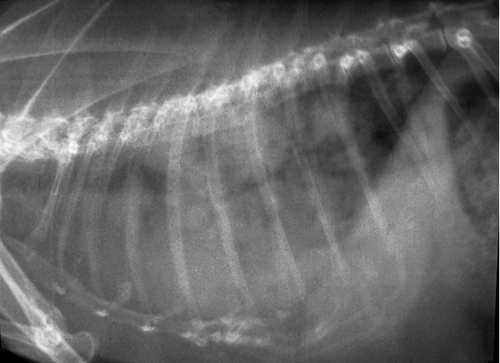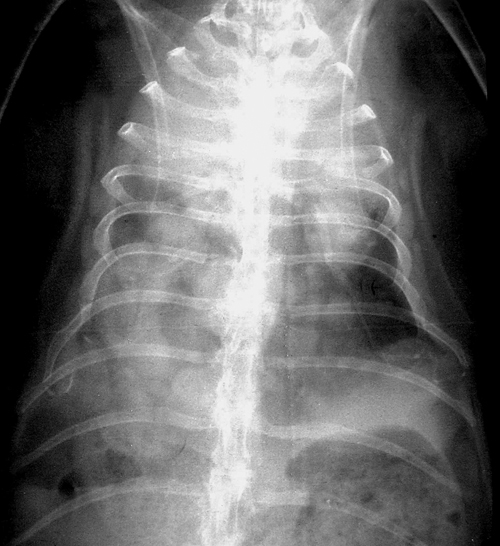Difference between revisions of "Rabbit Medicine and Surgery Q&A 21"
Ggaitskell (talk | contribs) |
|||
| Line 24: | Line 24: | ||
*pneumonia; | *pneumonia; | ||
*abscesses associated with pleuropneumonia; | *abscesses associated with pleuropneumonia; | ||
| − | *pleuropneumonia (secondary to infection with Pasteurella multocida, Pseudomonas aeruginosa, Staphylococcus aureus, Bordetella bronchiseptica, Mycobacterium bovis, M. tuberculosis, Moraxella bovis, Francisella tularensis and Yersinia pestis); | + | *pleuropneumonia (secondary to infection with ''Pasteurella multocida, Pseudomonas aeruginosa, Staphylococcus aureus, Bordetella bronchiseptica, Mycobacterium bovis, M. tuberculosis, Moraxella bovis, Francisella tularensis'' and ''Yersinia pestis''); |
*primary thoracic neoplasia (thymoma); and | *primary thoracic neoplasia (thymoma); and | ||
*secondary metastatic disease. <br><br> | *secondary metastatic disease. <br><br> | ||
Pleural effusion has been seen with cardiovascular disease (cardiomyopathy, valvular disease, pericarditis and atherosclerosis) and corona virus infection but this has not been reported as a spontaneous natural infection in pet rabbits. | Pleural effusion has been seen with cardiovascular disease (cardiomyopathy, valvular disease, pericarditis and atherosclerosis) and corona virus infection but this has not been reported as a spontaneous natural infection in pet rabbits. | ||
| − | |l2= | + | |l2=:Category:Respiratory Disease in Rabbits |
|q3=What is the prognosis? | |q3=What is the prognosis? | ||
|a3= | |a3= | ||
Latest revision as of 22:49, 24 September 2011
| This question was provided by Manson Publishing as part of the OVAL Project. See more Rabbit Medicine and Surgery questions |
A seven-year-old entire female Dutch rabbit, housed indoors, presents with weight loss, anorexia and acute-onset severe dyspnoea and rapid fatigue. The rabbit is thin, alert but weak. Mucous membranes are cyanotic but capillary refill time and pulse are normal. Abdominal palpation is tense. Lung sounds are generally decreased. There is a poor response to oxygen therapy. Lateral and dorsoventral radiographs are shown.
| Question | Answer | Article | |
| What is your diagnosis? | The radiographs show a nodular interstitial pattern. |
Link to Article | |
| What differential diagnoses would you consider in a seven-year-old rabbit with these clinical signs? | Differential diagnoses for lower respiratory tract disease include:
Pleural effusion has been seen with cardiovascular disease (cardiomyopathy, valvular disease, pericarditis and atherosclerosis) and corona virus infection but this has not been reported as a spontaneous natural infection in pet rabbits. |
Link to Article | |
| What is the prognosis? | The prognosis is grave and in this case the rabbit was euthanased. |
Link to Article | |
| What preventive measures are there to reduce the incidence of this condition? | Ovariohysterectomy before the rabbit is two years old will reduce the incidence of this condition in female rabbits. Dutch, French silver, Havana and Tan breeds older than four years of age have a 50–80% incidence of uterine adenocarcinoma. |
Link to Article | |

